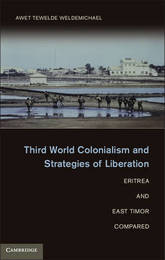
|
Third World Colonialism and Strategies of Liberation: Eritrea and East Timor Compared
Hardback
Main Details
Description
By analyzing Ethiopia's rule over Eritrea and Indonesia's rule over East Timor, Third World Colonialism and Strategies of Liberation compares the colonialism of powerful third world countries on their small, less powerful neighbors. Through a comparative study of Eritrean and East Timorese grand strategies of liberation, this book documents the inner workings of the nationalist movements and traces the sources of government types in these countries. In doing so, Awet Tewelde Weldemichael challenges existing notions of grand strategy as a unique prerogative of the West and opposes established understanding of colonialism as an exclusively Western project on the non-Western world. In addition to showing how Eritrea and East Timor developed sophisticated military and non-military strategies, Weldemichael emphasizes that the insurgents avoided terrorist methods when their colonizers indiscriminately bombed their countries, tortured and executed civilians, held them hostage, starved them deliberately, and continuously threatened them with harsher measures.
Author Biography
Awet Tewelde Weldemichael is an Assistant Professor in the Department of History at the University of Kentucky. He is also Fernand Braudel Fellow at the French Humanities Foundation, University of Paris Diderot. He has worked as a political affairs officer for the United Nations peacekeeping mission in East Timor and as a long-term election observer with the Carter Center mission in Sudan.
Reviews'In Third World Colonialism and Strategies of Liberation, Awet Tewelde Weldemichael narrates the experiences of these remarkable but often under-appreciated nationalist movements during struggles against both primary (European) and secondary (regional) colonial powers with a rare combination of laser-like precision and contextual breadth and depth that brings them alive and renders them comprehensible on their own terms. The unique strength of this work lies in the details he has ferreted out from key actors and informants, much of it available for the first time, that gives them both texture and density. In doing so, he provides us with one of the most clear and compelling accounts so far on not one but two intensely complex but vitally important political events, traditionally treated as isolated anomalies.' Dan Connell, author of Against All Odds: A Chronicle of the Eritrean Revolution 'Awet Tewelde Weldemichael's Third World Colonialism and Strategies of Liberation ... is a well-conceived and brilliantly written comparative analysis of the colonial resistance of two Third World wars of national liberation that were fought not against powerful European or Asian colonialists, but against hegemonic states in their own regions. The book is based on extensive fieldwork and careful historical-political analysis of a subject that is often ignored, and is a welcome addition to the field of comparative historical analysis.' Edmond J. Keller, University of California, Los Angeles 'Awet Tewelde Weldemichael has written an excellent history of two liberation struggles: Eritrea's and East Timor's. The two stories make for absorbing and instructive reading by anyone interested in twentieth-century liberation movements. The detailed discussion of the similarities and differences between the Eritrean and East Timorese liberation struggles provides fascinating case studies for history and comparative study buffs. The study re-examines the premise of previously held theories and views on the power tactics and strategies of survival of local groups engaged in a life-and-death struggle, as well as what kind of political system emerges as a result, and to what extent the armed struggle shapes these systems. In that sense, this study makes a significant contribution to historical and political studies.' Bereket Habte Selassie, University of North Carolina, Chapel Hill
|